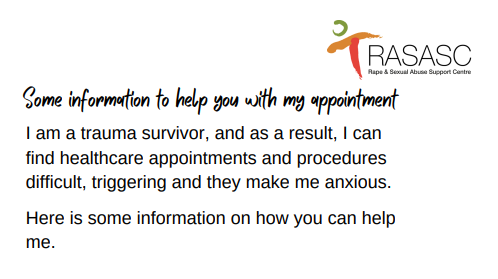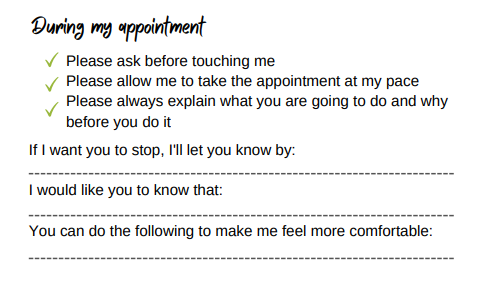Coping with medical appointments
As a sexual abuse survivor, healthcare appointments - particularly intimate procedures - can be difficult and potentially triggering.
Appointments for prostate exams, cervical smears, urology, pregnancy and antenatal checks and mammograms can all be potentially triggering, as well as many other procedures where the doctor or nurse has to get very close to you – such as eye tests or dentist appointments.
There are some steps you can take to make the process easier and less stressful for both you and the healthcare professional.
RASASC healthcare card
You can download our healthcare card to either print out or show on your phone at your appointment. The card explains, that as a survivor of trauma, healthcare appointments can be potentially triggering and you may need extra support. If you print it out, you can also add your own instructions to help the healthcare professional know how best to support you.
You can also:
- Call or email the practice in advance and ask them to explain what the procedure involves.
- Request a double appointment, and consider what time of day would be best in terms of managing your anxiety
- Request to see a healthcare professional of your preferred gender
- Take a trusted friend or family member with you for support
- Ask the healthcare professional to explain all parts of the examination to you as they are carrying them out.
- Ask for any adjustments to ensure you feel comfortable – whether you can insert any medical devices yourself, whether underwear can be left on but moved aside, if you would prefer not to use stirrups, whether your trusted friend can be present etc.
- Practice and use grounding techniques before and during your appointment to help manage any anxiety, such as the ones below.
Grounding techniques
There are several techniques you can try if you are feeling anxious to help ground you and reduce your feelings of anxiety
One of the first things you can do it to be aware of your breathing. Breathing quickly can worsen your feelings of panic and insecurity. By slowing down your breathing and breathing deeply, you will increase the oxygen in your blood, helping you to feel less anxious.
Place your hand on your stomach and breathe deeply, taking slow, deep breaths. Watch your hand move out when you breathe in and move in when you breathe out.
When you have slowed down your breathing, use your senses to focus on your surroundings:
- Look around you. What can you see?
- Inhale and focus on the smells around you. What can you smell?
- Tune in to the sounds around you. What can you hear?
- Have something to eat or drink. Focus on its flavour, what can you taste?
- Pick something up and move it between your hands. What does it feel like?
If you have a chair or somewhere to sit, you can try this exercise to help refocus your mind.
Sit on the chair and drop your attention down to your feet, feel the contact with the ground. Move your feet around on the floor, concentrate on the firmness of the floor. Curl up your toes for a few seconds and notice the sensation.
Turn your focus to the chair. Notice the feeling of sitting on the chair, and the contact you have with it. Press your back into the chair and feel how it supports you. If the chair has arms, run your hands along the arms to feel how solid they are, or feel the frame of the chair, and how it is moulded around you, holding you safely.
More help
Find more information and tips on dealing with nightmares, flashbacks and anxiety on our self help resources page, and have a look at our frequently asked questions for the answers to some other questions you may have.
If you need us, please get in touch: admin@rasasc-guildford.org 01483 568000









